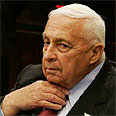
Convinced the public likes his inflexible leadership. Sharon
Photo: AFP
Ariel Sharon's failure yesterday to find a place in the government for two folks who supported his disengagement plan was his second fall in as many weeks.
As with every political process, there are plenty of explanations and commentaries to offer about this, mainly because no one knows just how Sharon is now leaning – to continue at the lead of the Likud Party, or outside the party framework.
Knesset Vote
Ilan Marciano
Knesset approves appointment of Ehud Olmert to post of finance minister. Earlier, MKs reject PM’s three ministerial appointments by 60-54 margin; Sharon slams Likud members who voted against proposal; source close to prime minister: This is a turning point
But Sharon hasn't made up his mind yet (he's said more than once, about several different issues, that there is no reason to decide anything before the last minute), and it seems that every attempt to tar the process with a conspiracy brush makes him appear more profound than he really is.
There is no need to say he's got sharp logic or mystery, but more than anything – the personality of a prime minister.
Sharon, especially in his strong position after the disengagement program, has little but scorn for his opponents – from Benjamin Netanyahu on down. This is one of his age-old characteristics.
Sharon has always been a man of power, who has outlasted people stronger than him, such as David Ben-Gurion and Moshe Dayan. But he is dismissive of the rest of the world.
When he was younger he wore this characteristic on his sleeve ("I'll strip you naked," he told Begin's Deputy Prime Minister Yigal Yadin); today, he is more wry, subtle, but no less profound.
No compromise
For the same reason, Sharon has never deviated from his chosen path, even when it brings him outright failure, and he is never willing to compromise.
The characteristic that Sharon most admires, and tries almost obsessively to demonstrate, is to appear nonchalant.
He was like that leading up to the vote on disengagement, despite the rebellion by Netanyahu, Limor Livnat and their cronies – and his success only strengthened his opinion that this is the way to lead.
In recent years, Sharon has even won votes in which he ostensibly lost – the most obvious example is the Likud Central Committee vote about Palestinian statehood, forced on Sharon by Netanyahu but won by Sharon.
Sharon is convinced that the public likes his inflexible leadership, and that losses like this last one only give him more power in the face of rebel Likudniks, who he successfully portrays as irresponsible extremists.
Paradoxically, by strengthening this image, Sharon manages to serve his main in the Likud – to show that only he can bring electoral victory – the only reason, perhaps also the decisive one, he is likely to win inside the party.
In this context, Sharon is different from rivals such as Netanyahu – he has no obsession to win.
Democracy?
A large part of the media supports him and builds up this feeling. This time, too, they crowned him. But objectively, the rebels are somewhat right: The process by which Sharon pushed through disengagement, including firing government ministers who disagreed with the plan, was far from model democracy – just like the clear prostitute's fee, he paid to those who provided the political goods.
But Sharon was never a paradigm of democratic rule. His message is "Only I can," and he believes this message works.
His strong position is almost unprecedented, but it has not removed the feelings of being pursued after decades of being a political outcast and the injustice that accompanied Sharon for years.
But it has changed its face: Some has become hubris, the pride of someone who "really showed them."
But even the ancient Greeks knew that hubris leads to mistakes. But in Sharon's case, it is not clear if the mistake is comic or tragic.
Ofer Shelah is a columnist for Israel's leading newspaper Yedioth Ahronoth















